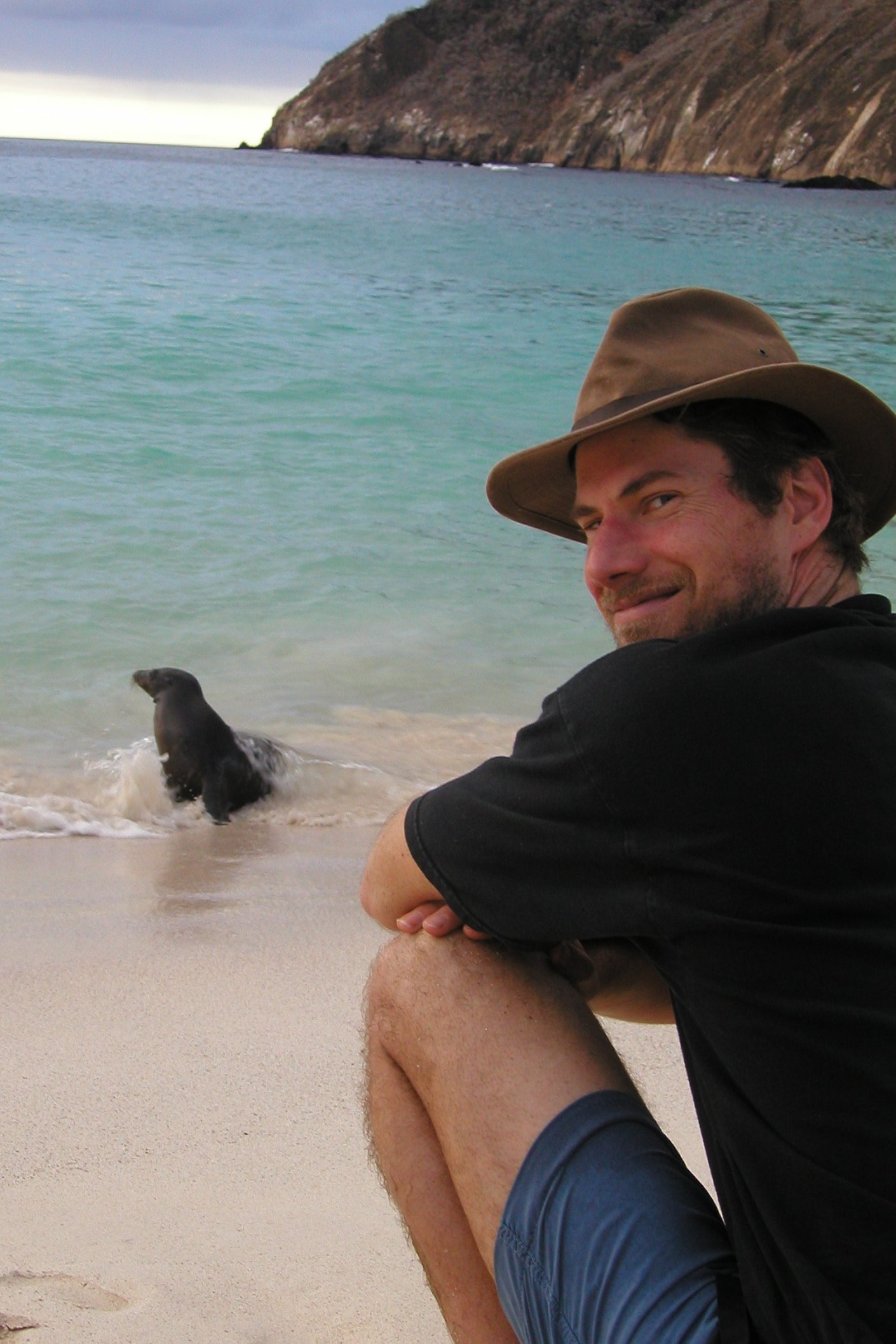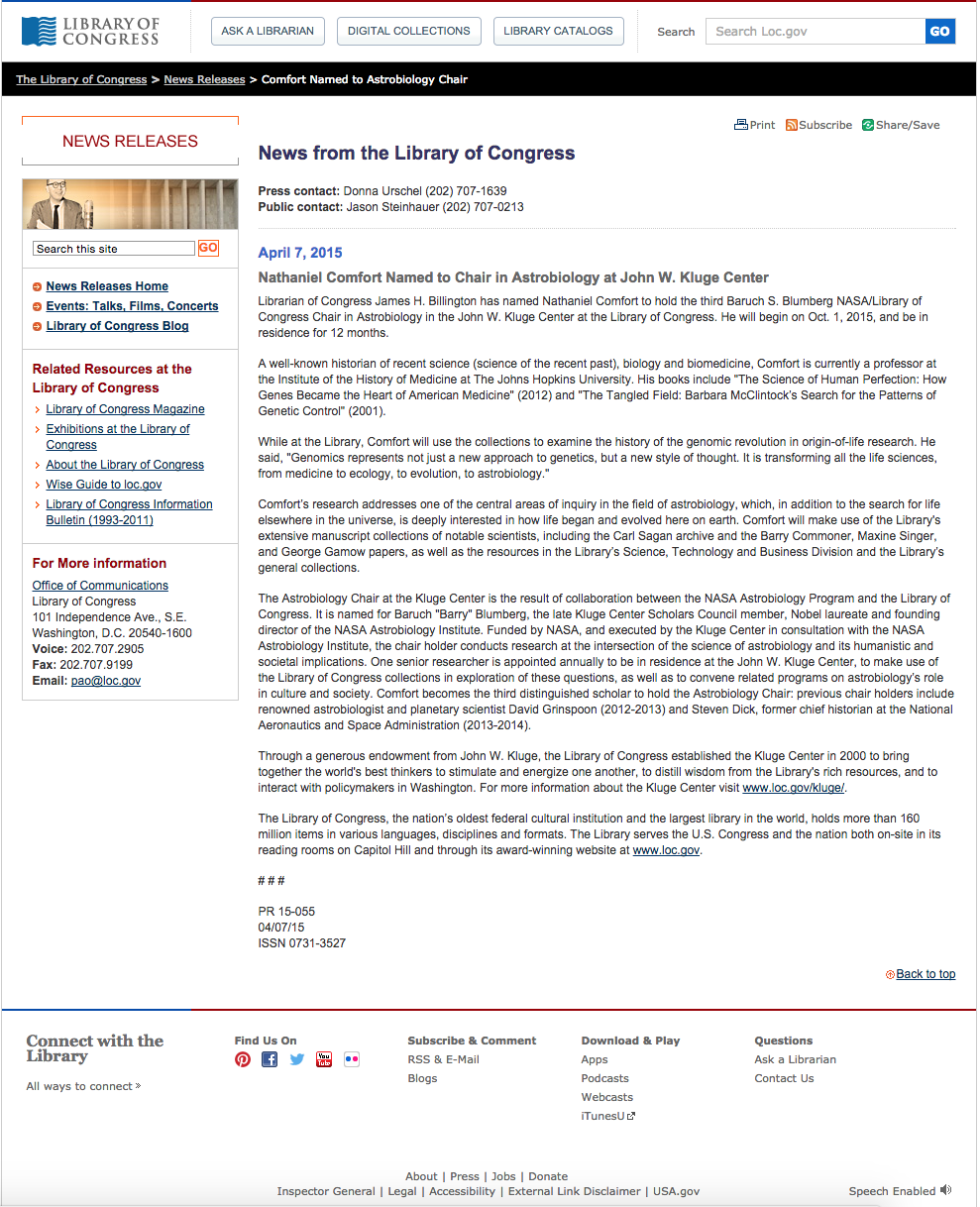Academic colleagues of mine who are only slightly or not at all involved with social media often ask me why I do it, while those of us who are involved often seem to find ourselves defending or proselytizing (see special essay series…). Yet one of the most important reasons for me is that it gets me out of the ivory tower for a bit of fresh air.
My Twitter feed is only maybe 20% historians of science and medicine. I follow and am followed by scientists, journalists, novelists, biotech executives and marketing types. I’m pretty sure my feed has a better racial and gender mix than my university, as well as a wider spectrum of political views and commitments. In short, Twitter broadens me.
Another reason I do it, though, is community service. I think that we who stroll the groves of Academe have a duty to get out and engage with the wider world somehow. One of my colleagues does political work in Latin America. Another raises consciousness about climate change. Yet another helped break the story about North Carolina’s official eugenic sterilization program—a story that led to an official apology from the state and reparations to at least some of the victims’ families. I’m not saying there shouldn’t be a place in the Academy for the dreaming scholar, alone with her books, researching esoterica. Supporting the gathering of knowledge for its own sake strikes me as a pretty good use of money. But those of us who are moved to do so can help keep the life of the mind vital and relevant by getting out and getting our hands dirty.
Regular Genotopia readers know that fighting genetic determinism is among my main causes. “Gene-for” explanations have a way of supporting the status quo, reinforcing existing power hierarchies, blaming the victim. When social problems are explained away with genetics, it tends to divert attention from environmental solutions. It lends an aura of power and inevitability to racism, sexism, and homophobia. The genetic determinist says, Black/Hispanic/poor people are innately less intelligent; why bother fixing the schools? Such arguments have been around in almost exactly the same form for a century or more. More data doesn’t seem to make a dent. Among the public, the popularity of genetic determinist thinking stems mainly from our desire for simple explanations and from the cultural authority of science. When scientists do it, it’s mostly because when all you’ve got is a sequencer, everything looks like a gene.
And yet lots of people use this kind of language without having insidious political ideologies. It’s easy, it’s ubiquitous, we’re conditioned to think this way. But when we use determinist language, inadvertently or not, we’re making real social change more difficult. So when I see such language in the popular press or in the scientific literature, I call it out—gently if I think it’s accidental, with a bit of a bite if I don’t.
My daily dose of determinism last Friday was in a piece by the science writer Greg Jenner. If you don’t know him, he does the BBC’s “Horrible Histories” and is the author, most recently, of the brand new book, A Million Years in a Day. He writes about science and history in a jokey, easily accessible way and has a large following, in several different media. The piece, published on his blog and tweeted by @erocdrah, was about the acquisition of language. It brought together data on the evolution of linguistic ability in Homo sapiens and other data on the absence of language in people with autism. I choked on one sentence, fairly far down in the piece, where he discussed evidence from the gene FOXP2, a potent gene that has been implicated in language—it has even been called “the Twitter gene.” Jenner wrote,
“Why can homo sapiens speak so eloquently, yet Neanderthals possibly couldn’t? The likeliest cause is genetics.”
This looked like a job for Anti-Genetic Determinism Man.
I tweeted that I wished he wouldn’t write sentences like that, and followed up with a respectful compliment to show that I wasn’t a troll. What followed was among the most rewarding experiences I’ve had on social media. I’ve storified the conversation:
After this exchange, Jenner sent me a direct message saying that he always wanted to avoid deterministic language and was happy to hear any other suggestions I had for how to improve the piece. I had to sign off for the evening though, and by the time I got back to it he’d already made his own edits. Not only did he change the offending sentence but he added several other tweaks to make sure it was clear that a trait as complex as speech does not—cannot—have a single cause. Here are the key paragraphs:
Why can homo sapiens speak so eloquently, yet Neanderthals possibly couldn’t? One factor is perhaps genetics. In 1990, scientists were introduced to the KE family (a label applied to protect their identity), who were three generations of Londoners struggling with an unusual medical condition. About half of them lacked fine motor control over their facial muscles, lips and tongues – making their speech unintelligibly slurred – and they also found grammar highly problematic. We now know that this family carried a faulty version of a gene called FOXP2 that regulates the expression of other genes, and seems to be crucial to speech. In fact, when given the human version in a recent experiment, the squeaks of mice dropped to a strange baritone sound. Admittedly, it’s not as if the rodents suddenly stood up on their hind legs and quoted the romantic poetry of William Wordsworth, but it’s still remarkable.
Whether a Planet of the Apes scenario of articulate chimps might be theoretically possible seems unlikely, as humans have also evolved descended larynxes and the crucially-positioned hyoid bone, both of which are vital components in producing our array of vocal sounds. But the fact remains that our ability to deliver a Shakespearean soliloquy is, in large part, the by-product of a lovely evolutionary accident. Had another gene mutated instead, you and I might possess glow-in-the-dark skin, or blue nipples as long as our index fingers. But, then again, maybe not. We have to be careful with our desires to apply a simplistic determinism to genetics, no matter how tempting it is to say “this is a gene for *insert thing*…”.
Ain’t that fine? That last sentence almost made me cry—and then I’d have had to dab my eyes with my long blue nipples. The entire piece is here. Afterward, Jenner wrote me to thank me for my comments and said he appreciated my expertise. I took care not to lecture, though, and I hope that the respectful tone I tried to strike helped keep him receptive. Pedantry is endemic among academic faculty and is a real barrier to wider engagement.
So. Thanks to Greg Jenner and all smart, skillful journalists who are receptive to a stuffy old professor. Thanks to the scientists who will talk with a humanist and to the private-sector executives who engage with an idealistic egghead. And thanks to everyone else on social media who use that platform, so crammed with idiocy and hate and bunk, to discuss serious ideas with civility and humor.
Like this:
Like Loading...

 Why astrobiology? My next project is a biography of DNA. One key part of the book will be the story of how we’ve come to understand the origins of DNA and the origin of life in an RNA world. So I’ll be using the unparalleled resources of the Library to write the history of origins research since the genome project, as well as working on the rest of the book.
Why astrobiology? My next project is a biography of DNA. One key part of the book will be the story of how we’ve come to understand the origins of DNA and the origin of life in an RNA world. So I’ll be using the unparalleled resources of the Library to write the history of origins research since the genome project, as well as working on the rest of the book.

You must be logged in to post a comment.